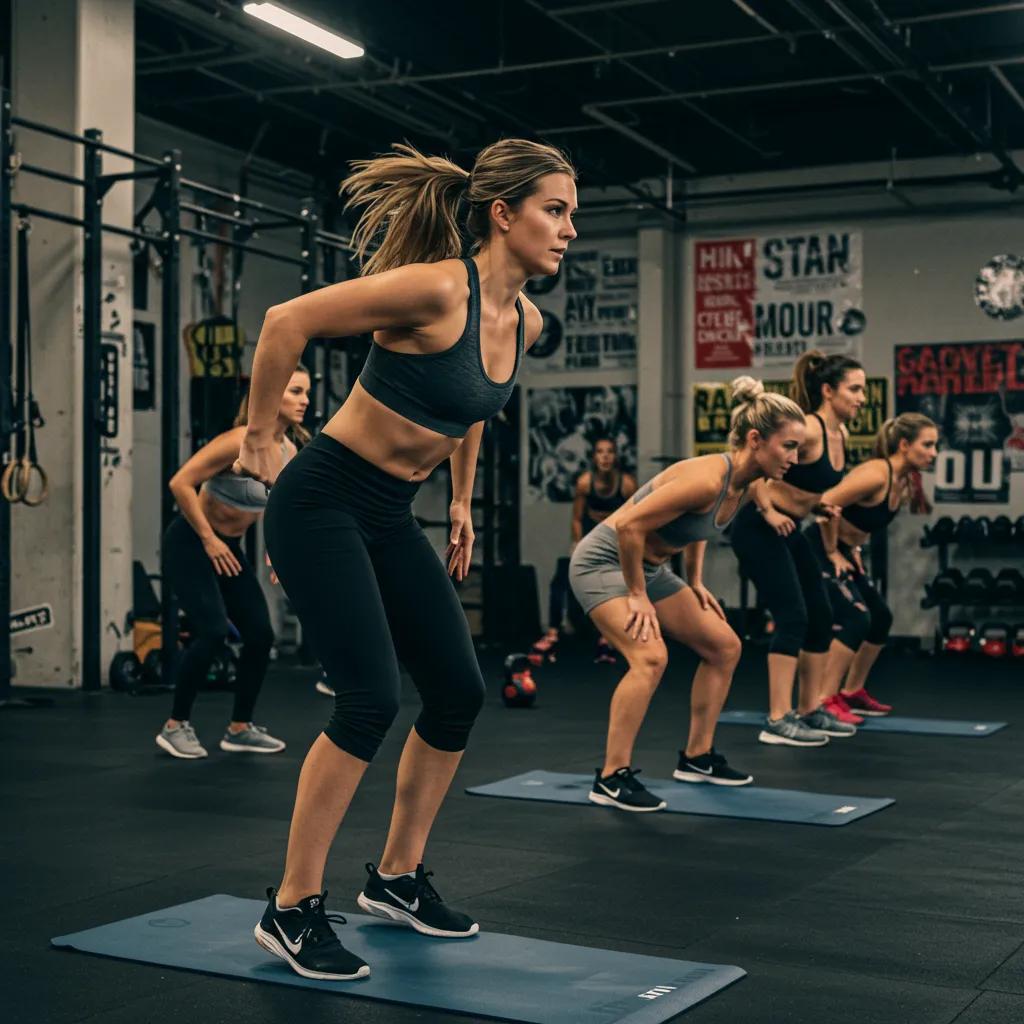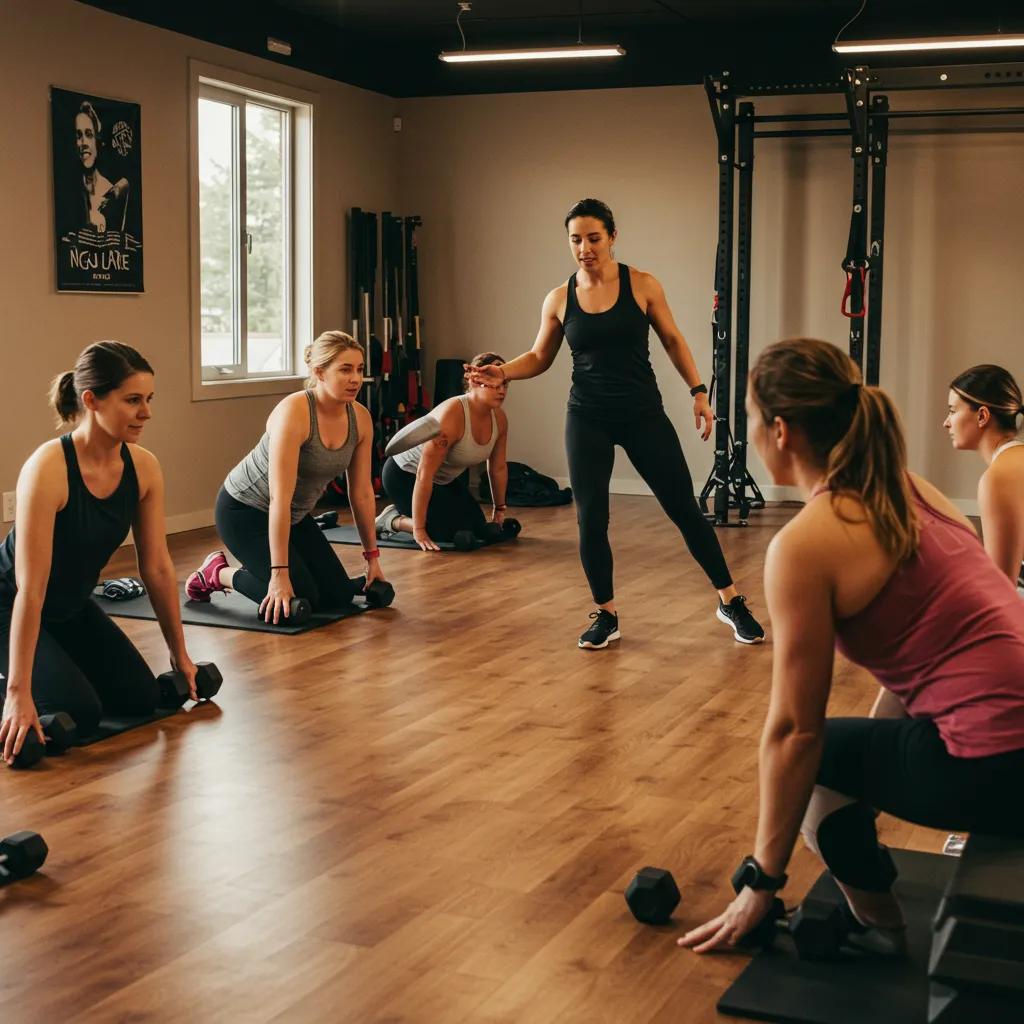Strength and Sweat: Top Workout Classes for Women in Auburn


Finding the right workout class in Auburn can transform strength, stamina, and self-confidence for women at any stage of fitness. This guide explains which class formats deliver the best strength and sweat results, the health science behind resistance work, and practical steps to evaluate and join small group personal training options in Auburn. Readers will learn how strength training improves bone density and metabolism, why HIIT complements resistance work, and how to pick community-focused programs that sustain progress. The article maps top class types, trainer qualifications to look for, and local discovery tips so women can choose classes that match goals, time, and budget.
Throughout, terms like Personal Training in Auburn and Small Group Personal Training in Auburn are used to connect readers to local options and class features.
What Are the Best Strength and Sweat Workout Classes for Women in Auburn?
Best strength-and-sweat classes for women in Auburn combine progressive resistance, movement quality, and metabolic conditioning to produce measurable results. These class formats focus on mechanical loading, progressive overload, and interval training to build muscle, boost resting metabolic rate, and improve cardiovascular fitness. Choosing between formats depends on goals: strength focus for long-term muscle and bone gains, HIIT for time-efficient conditioning, and small group personal training for individualized progression and accountability. The following list highlights the top three class types that consistently deliver strength and sweat benefits for women in Auburn.
- Small group personal training: Combines programming and individualized coaching for rapid strength gains.
- Women-focused strength classes: Emphasize compound lifts, progressive loading, and movement coaching.
- Women’s HIIT classes: Offer high-calorie burn and cardiovascular improvements in short sessions.
These class types cover most goals from beginner strength to advanced conditioning and help women select the format that matches their priorities and schedule.
Different class formats can be compared by size, duration, and coach-to-client ratio for clearer decision-making.
| Class Type | Class Size | Typical Duration | Coach Ratio | Best For |
|---|---|---|---|---|
| Small group personal training | 4–8 participants | 45–60 minutes | 1:4–1:8 | Strength gains, technique coaching |
| Women’s strength class | 8–15 participants | 45–60 minutes | 1:8–1:15 | Muscle building, progressive overload |
| Women’s HIIT class | 10–20 participants | 30–45 minutes | 1:10–1:20 | Fat loss, cardio conditioning |
This comparison clarifies trade-offs: smaller groups enable more coaching, longer sessions allow focused strength work, and HIIT fits tighter schedules. After evaluating these formats, many local providers in Auburn offer small-group or strength-specific classes; if you want local scheduling or trial options, look for studios advertising small group personal training or women-only strength classes in Auburn.
Which Strength Training Classes Are Designed Specifically for Women in Auburn?
Women-specific strength classes in Auburn typically structure sessions around proven compound movements with scaled progressions and mobility work. Sessions often open with a focused warm-up, progress to barbell or dumbbell compound lifts, include accessory work for posterior chain and core, and finish with mobility and breathing drills. Coaches adapt load, range of motion, and exercise selection to address common female training goals like strength, tone, and functional capacity.
A typical session example includes a 10-minute dynamic warm-up, 25–30 minutes of progressive strength sets, and a 10–15 minute mobility cooldown that reinforces movement patterns. This structure supports both beginners and experienced athletes by offering built-in progression and clear performance markers to track strength improvements over weeks. Research indicates that strength training programs can positively influence both the physical strength and self-concept of women.
Strength Training’s Impact on Women’s Strength and Self-Concept
The effects of a strength training program on the strength and self-concept of two female age groups
How Do HIIT Workouts Help Women Achieve Fitness Goals in Auburn?

HIIT workouts for women in Auburn produce improvements in cardiovascular fitness and metabolic conditioning through brief, high-intensity intervals followed by recovery periods. A standard HIIT session alternates 20–40 second work intervals with 10–60 second rests for 20–30 minutes, driving high calorie burn and improving VO2 max. HIIT complements strength training by enhancing endurance and accelerating fat loss while preserving muscle when paired with resistance work.
Modifications such as lower-impact intervals and adjusted work-to-rest ratios make HIIT accessible for beginners and women managing joint concerns or returning from pregnancy.
Understanding how HIIT complements resistance training helps women design balanced weekly plans that prioritize strength while maintaining metabolic fitness.
What Are the Benefits of Small Group Training for Women in Auburn?

Small group personal training combines individualized programming with community accountability to accelerate progress for women in Auburn. Coach-led sessions allow tailored load prescriptions, timely form corrections, and progressions that reduce injury risk and improve efficiency. Peer support in small groups increases adherence, creates accountability, and fosters long-term motivation through shared goals and community events. An anonymized example shows a participant increasing squat strength by 20% over eight weeks while reporting higher energy and consistent gym attendance due to group accountability. small group training
These benefits make small group models especially attractive for women seeking efficient, coached strength development with a supportive community.
Why Is Strength Training Important for Women’s Health and Fitness in Auburn?
Strength training provides distinct physiological and psychological advantages for women in Auburn by increasing bone strength, preserving muscle mass, and improving metabolic health. Mechanical loading from resistance exercise stimulates bone remodeling and muscle hypertrophy, which together reduce osteoporosis risk and raise resting metabolic rate. Beyond physical gains, structured strength programs improve functional independence, day-to-day energy, and confidence, which supports sustained exercise habits. Recent programs emphasize at least two resistance sessions per week to maintain bone and metabolic benefits, and local classes can deliver this frequency within realistic schedules.
| Training Mechanism | Biological Effect | Health Benefit |
|---|---|---|
| Mechanical loading via resistance | Stimulates bone remodeling | Increased bone density, lower fracture risk |
| Muscle hypertrophy from progressive overload | Raises resting metabolic rate | Improved weight management, metabolic health |
| Neuromuscular adaptation through practice | Enhances coordination and balance | Better functional strength, reduced fall risk |
Clear physiological mechanisms underlie these results and inform recommended class types and weekly frequency for optimal outcomes.
Studies have demonstrated that consistent resistance training can significantly improve both muscular strength and bone density, particularly in older women.
One-Year Resistance Training Effects on Elderly Women’s Strength and Bone Density
The purpose of this study was to investigate the effects of one year of progressive resistance exercise (PRE) on dynamic muscular strength and the relations to bone mineral density (BMD) in elderly women. Methods—Forty four healthy sedentary women (mean age 68.8 years) volunteered for this study and were randomly assigned to either an exercise group or a control group. The exercise group were involved in three one hour sessions a week for 52 weeks of supervised PRE to strengthen the large muscle groups of the body, while the control group were instructed to continue their normal lifestyle. The exercise circuit included three sets of eight repetitions at 75% of one repetition maximum focused on the large muscle groups. BMD was measured by dual energyxray absoptiometry (Lunar DPX) at the lumbar spine and at three sites in the proximal femur. Other selected parameters of physical fitness were
How Does Strength Training Improve Bone Density and Metabolism for Women?
Resistance training improves bone density by applying controlled mechanical stress that stimulates osteoblast activity and bone formation. Increasing muscle mass through progressive overload also elevates resting energy expenditure, supporting long-term weight management and improved metabolic health. Practical recommendations include two to three resistance-focused sessions per week with multi-joint movements and incremental load increases. Pairing resistance work with adequate protein intake and vitamin D supports adaptation and recovery for lasting benefits.
These mechanisms explain why class choices emphasizing progressive resistance are central to improving long-term skeletal and metabolic health.
What Confidence and Wellness Benefits Do Women Gain from Strength Training?
Women who commit to regular strength training often report gains in body confidence, stress resilience, and daily function that extend beyond the gym. Improved strength translates into easier performance of daily tasks, reduced pain in common problem areas, and a stronger sense of physical competence.
Psychologically, mastering progressive, measurable lifts builds self-efficacy and reduces anxiety around physical activity. Choosing classes that emphasize technique, progressive milestones, and peer support reinforces these wellness benefits and sustains habit formation.
How Can Women Join Small Group Personal Training Classes in Auburn?
Joining small group personal training in Auburn usually follows a clear, simple process that helps match goals with programming and coach style. Prospective members search local studios or community centers, review class formats and schedules, and often book an introductory trial or assessment to confirm fit. During sign-up, expect basic intake questions about goals, injuries, and availability, followed by an orientation that outlines class structure and progression metrics. Pricing typically reflects session frequency and coach ratio, and many providers offer trial classes or short-term passes to test the program before committing.
If you prefer hands-on onboarding, ask about trial classes, assessment sessions, and how progress is tracked; these options help ensure the program matches your needs and timeline.
What to Expect in Auburn’s Small Group Training for Women
A typical small group training session in Auburn begins with arrival and a brief coach check-in, followed by a 8–12 minute warm-up that primes joints and movement patterns. The main portion includes progressive strength sets or circuits tailored to the group’s ability, with coaches offering individualized cues and load adjustments. Sessions close with a structured cooldown and coach feedback that sets next session targets and highlights progress. Equipment commonly used includes barbells, dumbbells, kettlebells, and bodyweight stations that enable scalable progressions for all levels.
These structured elements ensure consistency and measurable improvements over weeks.
How Does Personalized Coaching Enhance Results in Small Group Settings?
Personalized coaching in small groups improves outcomes by prescribing appropriate loads, correcting form in real time, and sequencing progressions to match individual recovery. Coaches perform quick assessments and apply modifications such as scaled weight, altered rep schemes, or exercise substitutions to maintain intensity while reducing injury risk. This individualized attention accelerates strength gains and improves adherence compared with purely general group classes. Evidence shows coached programs yield better technique, faster progression, and higher retention among participants who receive consistent feedback.
Personalization within a group setting balances affordability with effective, tailored programming.
Who Are the Top Female Trainers Leading Strength and Sweat Classes in Auburn?
Evaluating trainers in Auburn focuses on certifications, specialization, and coaching style rather than brand recognition. Seek trainers with reputable certifications and experience in women’s strength programming, corrective exercise, or post-natal adaptations. Trainer selection affects program design, progression standards, and the quality of coaching cues that drive safe strength gains. When choosing classes, prioritize coaches who demonstrate clear progression models, deliver consistent feedback, and communicate measurable milestones to participants.
These trainer attributes directly influence the safety, progress, and community culture of strength and sweat classes.
What Certifications and Expertise Do Auburn’s Female Fitness Coaches Have?
Look for trainers holding nationally recognized certifications from organizations like NASM or ACSM and additional specialties in strength, corrective exercise, or post-natal training. These credentials indicate foundational knowledge of exercise science, program design, and client safety practices relevant to women’s health. Certifications combined with real-world coaching experience and ongoing education ensure trainers can scale programs appropriately and manage common concerns. When evaluating coaches, ask about their specific experience with women’s strength progression and any areas of specialization.
Verifying credentials helps ensure coaches provide evidence-based programming that supports long-term results.
How Do Trainers Support Women’s Fitness Goals Through Customized Workouts?
Trainers support goals by conducting initial assessments, setting measurable benchmarks, and designing progressions that build strength while minimizing injury risk. They use periodized programming, adjust loads based on performance, and introduce deloads or recovery strategies as needed. Progress tracking tools and regular reassessments ensure programming aligns with evolving goals, whether hypertrophy, fat loss, or functional strength. Effective trainers also coach behavior change and create accountability systems that sustain adherence over months.
This customized approach turns class attendance into consistent, measurable progress toward individual goals.
Where Can Women Find the Best Gyms and Fitness Communities for Strength and Sweat Classes in Auburn?
Finding the right gym or community in Auburn requires evaluating class schedules, coach quality, community culture, and pricing transparency. Search local studio listings, community center programs, and social channels to compare offerings and see how coaches communicate their progression models. Prioritize facilities that publish class types, coach qualifications, and flexible trial or pass options so you can test fit before committing. Community elements such as mentorship programs, member events, and peer groups often predict higher retention and better long-term results.
As you compare options, focus on how well each place supports consistent training habits and measurable strength progress.
What Makes Auburn’s Women-Only Fitness Communities Supportive and Effective?
Supportive communities combine mentorship, regular events, and channels for peer encouragement that promote consistency and motivation. Activities such as group challenges, skill workshops, and social meetups strengthen bonds and increase accountability. These features create an inclusive environment where women feel comfortable progressing at their own pace and celebrating milestones. Communities that emphasize mentorship and positive reinforcement consistently show better member adherence and satisfaction.
A strong community both motivates attendance and fosters resilience during plateaus. A strong community
How to Access Class Schedules, Pricing, and Membership Options in Auburn?
To access schedules and pricing, check local studio listings, call community centers, or explore social channels for current class times and pass options. Ask specific questions about drop-in policies, trial classes, cancellation terms, and coach-to-client ratios to compare value. Request information on how progress is tracked and whether assessments or onboarding sessions are included. These practical queries help you select a programs that aligns with your budget, timetable, and support needs.
When possible, use a trial class or short pass to confirm coach style and community fit before committing to a longer membership.
Frequently Asked Questions
What should beginners know before starting strength training classes in Auburn?
Beginners should focus on understanding the fundamentals of strength training, including proper form and technique. It’s essential to start with lighter weights to master movements before progressing to heavier loads. Many classes in Auburn offer introductory sessions or assessments to help newcomers acclimate. Additionally, beginners should communicate any injuries or concerns with their trainers to receive tailored guidance. Consistency is key, so setting realistic goals and maintaining a regular schedule will help build confidence and strength over time.
How can women track their progress in strength training classes?
Tracking progress in strength training can be achieved through various methods, such as keeping a workout journal, using fitness apps, or participating in regular assessments with trainers. Many classes in Auburn incorporate progress tracking tools that allow participants to log weights, repetitions, and personal bests. Additionally, setting specific, measurable goals can help women stay motivated and focused. Regularly reviewing these metrics with a coach can provide insights into improvements and areas needing attention, ensuring a structured approach to fitness.
Are there any specific nutritional guidelines women should follow when strength training?
Nutrition plays a crucial role in supporting strength training efforts. Women should focus on a balanced diet rich in protein, healthy fats, and complex carbohydrates to fuel workouts and aid recovery. Consuming protein-rich foods post-workout can help repair muscles and promote growth. Staying hydrated is also essential for optimal performance. Consulting with a nutritionist or dietitian can provide personalized dietary recommendations that align with individual fitness goals, ensuring that nutritional intake supports strength training effectively.
What are the common misconceptions about women and strength training?
One common misconception is that strength training will make women bulky, which is largely untrue. Women typically have lower testosterone levels than men, making it difficult to gain significant muscle mass. Instead, strength training helps women achieve a toned appearance, improve metabolism, and enhance overall health. Another misconception is that women should avoid heavy weights; in reality, lifting heavier weights with proper form can lead to better strength gains and bone health. Education and awareness can help dispel these myths.
How do community aspects enhance the experience of strength training for women?
Community aspects significantly enhance the strength training experience by fostering a supportive environment. Women often feel more motivated and accountable when training in groups, as they can share challenges and celebrate successes together. Many classes in Auburn incorporate social events, challenges, and mentorship programs that strengthen bonds among participants. This sense of belonging can lead to increased adherence to fitness routines and a more enjoyable overall experience, making it easier to stay committed to long-term fitness goals.
What should women look for in a strength training coach?
When selecting a strength training coach, women should prioritize qualifications, experience, and coaching style. Look for trainers with reputable certifications in strength training and experience working with women. A good coach should demonstrate effective communication skills, provide personalized feedback, and create a supportive atmosphere. Additionally, they should be knowledgeable about modifications for different fitness levels and any specific needs, such as post-natal adaptations. A strong rapport with the coach can enhance motivation and lead to better results.
How can women maintain motivation in their strength training journey?
Maintaining motivation in strength training can be achieved through setting clear, achievable goals and celebrating milestones along the way. Joining classes with a community aspect can provide social support and accountability. Additionally, varying workouts to include different exercises and formats can keep routines fresh and engaging. Tracking progress and regularly reassessing goals with a coach can also help maintain focus. Lastly, remembering the physical and mental benefits of strength training can reinforce commitment to the journey.
Conclusion
Choosing the right workout class in Auburn can significantly enhance strength, stamina, and self-confidence for women at any fitness level. By understanding the benefits of small group personal training, women can find supportive environments that foster accountability and progress. Explore local options that align with your goals and schedule to experience the transformative power of strength training. Start your journey today by checking out our recommended classes and trainers in Auburn.

